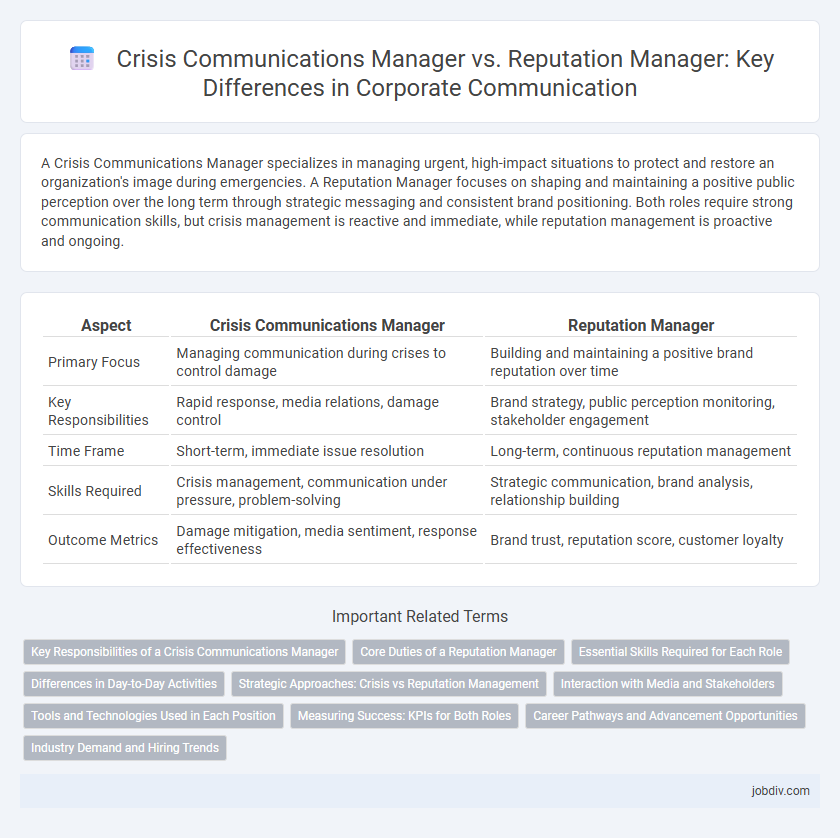A Crisis Communications Manager specializes in managing urgent, high-impact situations to protect and restore an organization's image during emergencies. A Reputation Manager focuses on shaping and maintaining a positive public perception over the long term through strategic messaging and consistent brand positioning. Both roles require strong communication skills, but crisis management is reactive and immediate, while reputation management is proactive and ongoing.
Table of Comparison
| Aspect | Crisis Communications Manager | Reputation Manager |
|---|---|---|
| Primary Focus | Managing communication during crises to control damage | Building and maintaining a positive brand reputation over time |
| Key Responsibilities | Rapid response, media relations, damage control | Brand strategy, public perception monitoring, stakeholder engagement |
| Time Frame | Short-term, immediate issue resolution | Long-term, continuous reputation management |
| Skills Required | Crisis management, communication under pressure, problem-solving | Strategic communication, brand analysis, relationship building |
| Outcome Metrics | Damage mitigation, media sentiment, response effectiveness | Brand trust, reputation score, customer loyalty |
Key Responsibilities of a Crisis Communications Manager
A Crisis Communications Manager is responsible for developing and executing strategic communication plans during emergencies to protect the organization's brand and maintain stakeholder trust. They coordinate rapid response efforts, manage media relations, and ensure consistent messaging across all channels to mitigate reputational damage. Monitoring public sentiment and collaborating with internal teams to address potential risks are critical components of their role.
Core Duties of a Reputation Manager
A Reputation Manager specializes in monitoring and enhancing a brand's public image by managing online reviews, social media presence, and stakeholder perceptions to build trust and loyalty. Core duties include analyzing sentiment data, developing proactive communication strategies, and coordinating with marketing and PR teams to ensure consistent messaging. This role prioritizes long-term reputation growth rather than reactive crisis response, which distinguishes it from the duties of a Crisis Communications Manager.
Essential Skills Required for Each Role
Crisis Communications Managers require expertise in rapid decision-making, message clarity under pressure, and media relations to mitigate immediate threats. Reputation Managers focus on long-term brand positioning, stakeholder engagement, and strategic content creation to maintain and enhance public perception. Both roles demand strong interpersonal communication, analytical thinking, and adaptability to evolving situations.
Differences in Day-to-Day Activities
Crisis Communications Managers focus on rapid response, managing real-time information flow during emergencies to mitigate damage, often coordinating with media and internal teams. Reputation Managers engage in long-term strategies to build and maintain a positive public image through consistent brand messaging, public relations campaigns, and stakeholder engagement. Daily tasks for Crisis Communications involve monitoring breaking news and drafting urgent statements, whereas Reputation Managers analyze public perception data and develop proactive communication plans.
Strategic Approaches: Crisis vs Reputation Management
Crisis Communications Managers prioritize rapid response and transparent messaging to contain immediate threats, focusing on damage control during events that can harm an organization's stability. Reputation Managers develop long-term strategies that build trust and credibility through consistent brand messaging and stakeholder engagement. Both roles require strategic planning, but crisis management centers on urgent intervention while reputation management emphasizes sustained relationship-building.
Interaction with Media and Stakeholders
A Crisis Communications Manager prioritizes immediate, transparent communication with media and stakeholders to manage urgent issues and contain negative impact. Reputation Managers engage in ongoing dialogue with media and stakeholders to build trust, reinforce brand values, and shape long-term public perception. Effective interaction by both roles requires strategic messaging tailored to audience needs and situational context.
Tools and Technologies Used in Each Position
Crisis Communications Managers leverage real-time monitoring tools like Meltwater and Hootsuite to track emerging threats and deploy rapid response strategies through mass communication platforms such as SMS alerts and press release distribution services. Reputation Managers use advanced sentiment analysis software like Brandwatch and AI-driven reputation management platforms to analyze public perception, manage online reviews, and optimize long-term brand image through SEO and content management systems. Both roles integrate CRM tools to maintain stakeholder relationships but differ in immediacy of response versus ongoing brand health analytics.
Measuring Success: KPIs for Both Roles
Crisis Communications Managers measure success through KPIs such as response time to incidents, media sentiment analysis, and the containment rate of negative coverage during a crisis. Reputation Managers focus on long-term brand health metrics including net promoter score (NPS), social media engagement rates, and share of voice in target markets. Both roles rely on customer feedback surveys and sentiment tracking tools to evaluate the effectiveness of their communication strategies.
Career Pathways and Advancement Opportunities
Crisis Communications Managers typically advance by honing skills in rapid response, risk assessment, and media relations, often progressing to senior roles in corporate communication or public affairs. Reputation Managers focus on long-term brand strategy, stakeholder engagement, and sustainability initiatives, which can lead to executive positions such as Chief Communications Officer or Brand Strategist. Both pathways offer opportunities for cross-functional leadership, with the potential to influence organizational strategy and policy at the highest levels.
Industry Demand and Hiring Trends
Crisis Communications Managers are increasingly sought after in industries prone to sudden disruptions, with Gartner reporting a 25% rise in demand over the past two years. Reputation Managers, while traditionally focused on long-term brand perception, now see steady hiring trends as companies emphasize integrated communication strategies; LinkedIn data shows a 15% growth in these roles in the last year. Both positions require expertise in digital media and stakeholder engagement, reflecting evolving priorities in corporate communication departments.
Crisis Communications Manager vs Reputation Manager Infographic

 jobdiv.com
jobdiv.com